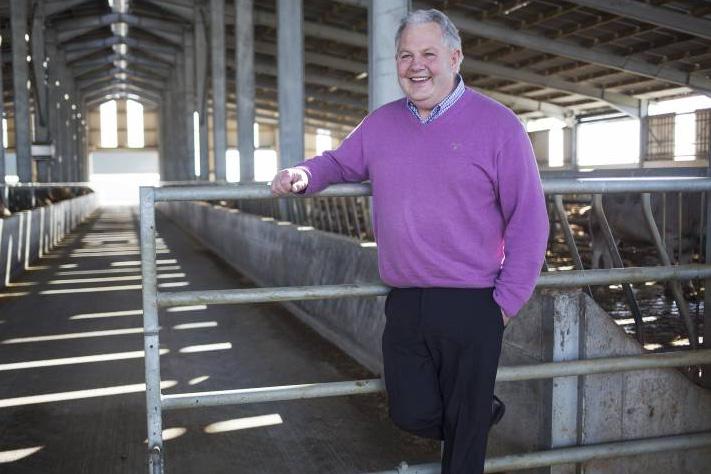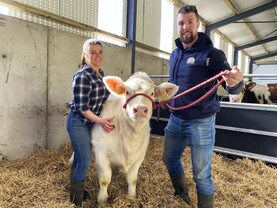Farming heritage in the Hoey family dates back to the 1850s in Lusk, north county Dublin. Michael, managing director of Country Crest, and Gabriel, operations manager, are the fourth generation of the business and both are founders of the Country Crest brand established in 1993.
The brand was in the spotlight recently after featuring in a report carried out by DCU’s Centre for Family Business on lessons to be learned from family businesses in north Dublin.
Country Crest was one of the case studies for the report and Michael was full of praise for DCU’s work in highlighting the particular set of challenges facing family businesses, including that of succession.
“The DCU family business centre is very important as it brings a focus to this issue of planning for succession in a family business”, he tells the Irish Farmers Journal.
The main operation at Country Crest is growing and packing fresh potatoes for the retail sector. The company currently packages 500t to 600t of potatoes per week and 150t to 200t of onions, which became part of the Country Crest brand after the drop in potato consumption in the 2000s.
All of the vegetables are sold under private label, as are the company’s chilled ready-made foods, such as prepared meals and soups. These are produced by Ballymaguire Foods, founded by Country Crest in 2008.
It’s like a game of snakes and ladders sometimes
One of the lessons Michael has learned from working in a family business is “never to get complacent”.
“Every day you have to act as if it is your first day," he says. “It’s like a game of snakes and ladders sometimes. You think you’re getting on very well but then there is the way back down again.”
He adds that working in the family business means “you have to work very hard at what you do and you have to be honest about the business and humble as well. That’s so important.”
Working with family and agribusiness pressures
Michael and his brother are the only two family members in the business but, fortunately, neither of them has ever had any issues working with the other.
“I've always got on well with my brother,” Michael says. “We’ve been very fortunate that way.” Hinting at maybe one of the ways family members can best work together, Michael adds that Gabriel “works in another side of the business, as operations manager”.
The company currently employs 235 people and has a group turnover of €40m to €80m.
Retailers are killing each other for market share and it’s driving the price of food into the ground
According to Michael, one of the main pressures facing agribusinesses at the moment is Ireland’s current food policy, where consumers “expect to buy food for nothing”.
“That is creating a massive challenge, be it in the dairy sector or the vegetable sector or the meals sector that we operate in. There’s probably too much retail space across this country and other countries and they’re killing each other for market share and it’s driving the price of food into the ground.”
Listen to an interview with Michael Hoey in our podcast below:
He adds that people in Ireland are eating more outside the home than before, something which is driving more competition into the sector.
“That was something we recognised some years ago,” he says, “that if we didn’t expand out of just primary vegetables, we wouldn’t be reaching this consumer who wants to have something ready in 20 minutes. That’s where Ballymaguire Foods comes in.”
Supporting farmers in Haiti
Corporate social responsibility is a huge part of Country Crest and it is something that Michael feels very strongly about. The company’s main charitable project is the Christine Valley Model Farm in Haiti, which emerged when Michael, one of a group of Ernst and Young Entrepreneur of the Year finalists, visited Haiti in 2008.
“Luck has a lot to do with any business and we are very grateful for where we have got to today,” he reflects. “You always have to be mindful of people who are less fortunate, be it in Ireland or abroad. That’s why we got involved in the project.”
Michael flies to Haiti as often as he can to visit the project.
“It’s great to work with people who are so enthusiastic about wanting to feed themselves. It brings you back to ground pretty quickly. We’re all only on the planet for a very short few years and if you can do something to help others while you’re here...well, that’s well worth doing.”
Succession
As for the plan for succession in Country Crest, Michael says the next generation is currently too young to know whether or not they will go into the business. But he adds that although he would like them to go into the business, the reality of it is that what is best for the business is more important than keeping it in the family.
“It is important to make sure the business continues and is sustainable. If it is people that work within the business that continue that, other than the family, then maybe that’s the better way of doing it. We don’t know that yet.”
Read more
Achieving 100% sustainability on the farm
Farming heritage in the Hoey family dates back to the 1850s in Lusk, north county Dublin. Michael, managing director of Country Crest, and Gabriel, operations manager, are the fourth generation of the business and both are founders of the Country Crest brand established in 1993.
The brand was in the spotlight recently after featuring in a report carried out by DCU’s Centre for Family Business on lessons to be learned from family businesses in north Dublin.
Country Crest was one of the case studies for the report and Michael was full of praise for DCU’s work in highlighting the particular set of challenges facing family businesses, including that of succession.
“The DCU family business centre is very important as it brings a focus to this issue of planning for succession in a family business”, he tells the Irish Farmers Journal.
The main operation at Country Crest is growing and packing fresh potatoes for the retail sector. The company currently packages 500t to 600t of potatoes per week and 150t to 200t of onions, which became part of the Country Crest brand after the drop in potato consumption in the 2000s.
All of the vegetables are sold under private label, as are the company’s chilled ready-made foods, such as prepared meals and soups. These are produced by Ballymaguire Foods, founded by Country Crest in 2008.
It’s like a game of snakes and ladders sometimes
One of the lessons Michael has learned from working in a family business is “never to get complacent”.
“Every day you have to act as if it is your first day," he says. “It’s like a game of snakes and ladders sometimes. You think you’re getting on very well but then there is the way back down again.”
He adds that working in the family business means “you have to work very hard at what you do and you have to be honest about the business and humble as well. That’s so important.”
Working with family and agribusiness pressures
Michael and his brother are the only two family members in the business but, fortunately, neither of them has ever had any issues working with the other.
“I've always got on well with my brother,” Michael says. “We’ve been very fortunate that way.” Hinting at maybe one of the ways family members can best work together, Michael adds that Gabriel “works in another side of the business, as operations manager”.
The company currently employs 235 people and has a group turnover of €40m to €80m.
Retailers are killing each other for market share and it’s driving the price of food into the ground
According to Michael, one of the main pressures facing agribusinesses at the moment is Ireland’s current food policy, where consumers “expect to buy food for nothing”.
“That is creating a massive challenge, be it in the dairy sector or the vegetable sector or the meals sector that we operate in. There’s probably too much retail space across this country and other countries and they’re killing each other for market share and it’s driving the price of food into the ground.”
Listen to an interview with Michael Hoey in our podcast below:
He adds that people in Ireland are eating more outside the home than before, something which is driving more competition into the sector.
“That was something we recognised some years ago,” he says, “that if we didn’t expand out of just primary vegetables, we wouldn’t be reaching this consumer who wants to have something ready in 20 minutes. That’s where Ballymaguire Foods comes in.”
Supporting farmers in Haiti
Corporate social responsibility is a huge part of Country Crest and it is something that Michael feels very strongly about. The company’s main charitable project is the Christine Valley Model Farm in Haiti, which emerged when Michael, one of a group of Ernst and Young Entrepreneur of the Year finalists, visited Haiti in 2008.
“Luck has a lot to do with any business and we are very grateful for where we have got to today,” he reflects. “You always have to be mindful of people who are less fortunate, be it in Ireland or abroad. That’s why we got involved in the project.”
Michael flies to Haiti as often as he can to visit the project.
“It’s great to work with people who are so enthusiastic about wanting to feed themselves. It brings you back to ground pretty quickly. We’re all only on the planet for a very short few years and if you can do something to help others while you’re here...well, that’s well worth doing.”
Succession
As for the plan for succession in Country Crest, Michael says the next generation is currently too young to know whether or not they will go into the business. But he adds that although he would like them to go into the business, the reality of it is that what is best for the business is more important than keeping it in the family.
“It is important to make sure the business continues and is sustainable. If it is people that work within the business that continue that, other than the family, then maybe that’s the better way of doing it. We don’t know that yet.”
Read more
Achieving 100% sustainability on the farm






 This is a subscriber-only article
This is a subscriber-only article










SHARING OPTIONS: